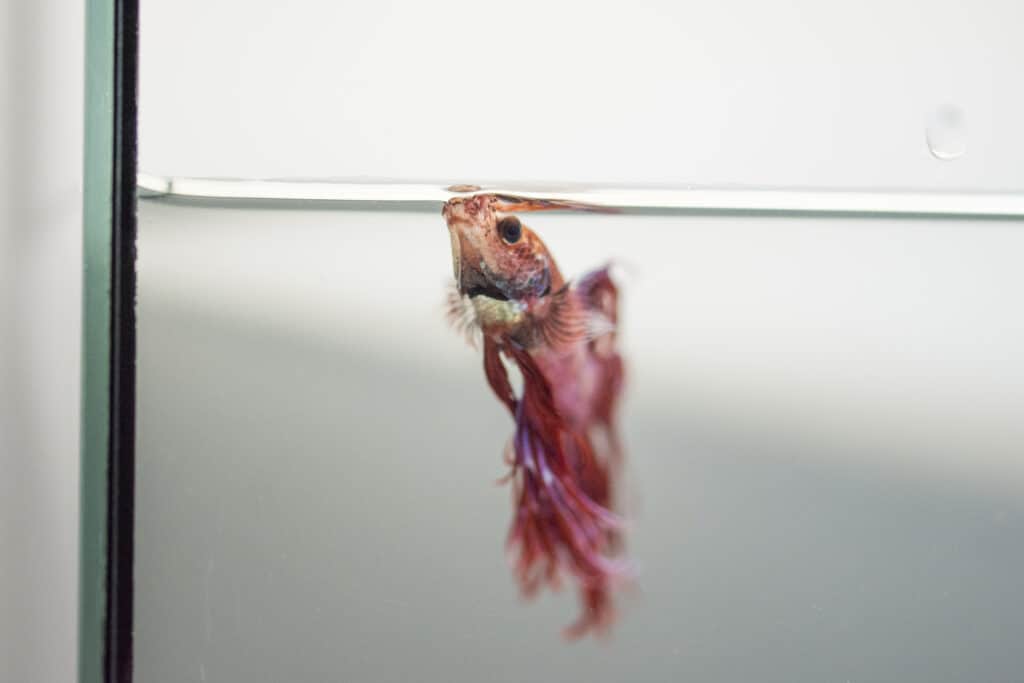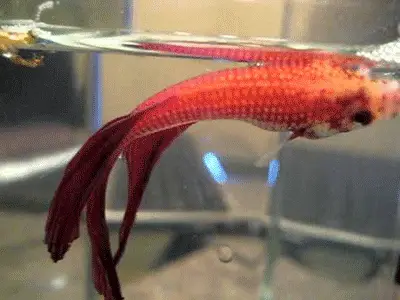Originally posted on May 18, 2023 @ 5:00 pm
Last Updated on 2 months by admin
As pet owners, we often become attached to our little aquatic friends. However, death is a natural part of life, and it’s important to know what to expect when our betta fish pass away. In this article, we’ll explore the various physical changes that occur when a betta fish dies, so you can be prepared and handle the situation with care and understanding.
While it’s not a pleasant topic to think about, understanding the signs of a dying betta fish is crucial for ensuring their well-being and comfort in their final moments. From changes in color to unusual behaviors, we’ll cover everything you need to know about how betta fish look when they die. So, let’s dive in and explore this delicate subject together.
When a Betta fish dies, it will typically float to the top of the aquarium. The color of the fish may also fade, and its body may become stiff. The eyes of the Betta fish may appear cloudy or sunken, and there may be discoloration or bloating in the abdomen area. It’s important to remove the fish from the tank and dispose of it properly to prevent any contamination of the water.

H2: HOW DO BETTA FISH LOOK WHEN THEY DIE?
Betta fish are popular pets known for their vibrant colors and long, flowing fins. However, like all living things, they eventually come to the end of their lives. If you are a betta fish owner, you may be wondering how your fish will look when it dies. In this article, we will explore the physical signs that indicate a betta fish is nearing the end of its life.
H3: CHANGES IN BEHAVIOR
When a betta fish is close to death, it will often exhibit changes in behavior. You may notice that your fish is less active than usual, and spends more time resting at the bottom of the tank. It may also lose its appetite, and may refuse to eat even its favorite foods. Additionally, the fish may become more irritable and aggressive towards other fish in the tank.
One of the most telling signs that a betta fish is nearing the end of its life is when it starts to swim upside down. This is a sign of organ failure, and indicates that the fish is in its final stages of life.
H3: PHYSICAL SYMPTOMS
In addition to changes in behavior, a dying betta fish will also exhibit physical symptoms. One of the most common signs is a loss of color. The fish may become pale or gray, and its fins may begin to look ragged or frayed. Additionally, the fish’s eyes may become cloudy or opaque.
Another physical symptom of a dying betta fish is bloating. The fish may appear swollen or distended, and its scales may start to protrude. This is a sign that the fish’s organs are failing and that it is close to death.
H3: POST-MORTEM SIGNS
If your betta fish has died, there are several post-mortem signs that can help you confirm the cause of death. One of the most obvious signs is rigor mortis. When a fish dies, its muscles will contract and stiffen, making it difficult to move the body.
Another post-mortem sign is discoloration. As the fish’s body begins to decompose, it may turn a gray or green color. Additionally, you may notice a foul odor coming from the tank.
H3: PREVENTING DEATH
While death is a natural part of life, there are steps you can take to prevent premature death in your betta fish. First and foremost, it is important to provide your fish with a clean, healthy environment. This means regularly changing the water in the tank, and ensuring that the temperature and pH levels are appropriate for your fish.
You should also feed your betta fish a healthy, balanced diet. Avoid overfeeding, as this can lead to health problems such as bloating and organ failure. Finally, be sure to monitor your fish’s behavior and physical condition closely, and seek veterinary care if you notice any signs of illness.
H3: BENEFITS OF BETTA FISH
Despite their relatively short lifespans, betta fish are popular pets for a number of reasons. For one, they are relatively easy to care for, and can thrive in a variety of environments. They are also known for their stunning colors and unique personalities, which can provide hours of entertainment for their owners.
Additionally, many people find that caring for a betta fish can be a calming and relaxing activity. Watching the fish swim and interact with its environment can be a great stress-reliever, and can help promote a sense of peace and tranquility.
H3: BETTA FISH VS OTHER FISH
While betta fish are beloved by many pet owners, they are not the right choice for everyone. One of the main factors to consider is the size of the tank. Bettas require at least a five-gallon tank to thrive, which can be larger than what some people are willing or able to provide.
Additionally, bettas are known for their aggressive tendencies towards other fish. If you plan to keep other fish in the same tank, it is important to choose species that are compatible with bettas and won’t be harmed by their territorial behavior.
H3: CONCLUSION
In conclusion, betta fish are unique and fascinating pets that require proper care and attention to thrive. While death is a natural part of life, there are steps you can take to prevent premature death in your betta fish. By providing a clean and healthy environment, feeding a balanced diet, and monitoring your fish’s behavior and physical condition, you can help ensure that your betta fish lives a long and healthy life.
Frequently Asked Questions
Betta fish are popular pets among fish enthusiasts. They are known for their bright colors and easy maintenance. However, like all living creatures, eventually, they will pass away. Here are some frequently asked questions about how betta fish look when they die.
How do you know if a betta fish is dying?
There are several signs that a betta fish is dying. One of the first signs is a loss of appetite. Betta fish will also become lethargic and may not swim around as much. Their color may also start to fade, and they may develop white spots on their body. Finally, betta fish may start to gasp for air at the surface of the water, as they struggle to breathe.
If you notice any of these signs, it’s essential to check your betta fish’s water conditions and make any necessary changes. However, if your betta fish is beyond help, it may be time to humanely euthanize them to prevent further suffering.
What does a dying betta fish look like?
A dying betta fish will start to display several physical signs that indicate their health is deteriorating. One of the first signs is a loss of vibrancy in their color. Their fins may start to droop, and they may also develop white spots or patches on their body. In severe cases, betta fish may develop red streaks on their fins or body.
As a betta fish starts to weaken, they may spend more time at the bottom of the tank or floating at the surface. Their breathing may become labored, and they may start to gasp for air. If you notice any of these signs, it’s essential to take action to prevent further suffering.
How long does it take for a betta fish to die?
The amount of time it takes for a betta fish to die can vary depending on the underlying cause. If a betta fish is suffering from a disease or infection, they may decline rapidly. In some cases, a betta fish may die within a few hours or days of displaying symptoms.
However, if a betta fish’s health is deteriorating due to poor water conditions, the decline may be more gradual. Betta fish can survive in poor water conditions for some time, but eventually, it will take its toll on their health. If you notice any signs of poor water quality, it’s essential to take action immediately to prevent further harm to your betta fish.
What happens to a dead betta fish?
Once a betta fish passes away, it’s essential to remove their body from the tank as soon as possible. Leaving a dead fish in the tank can lead to a buildup of harmful bacteria that can harm other fish in the tank.
You can dispose of your betta fish’s body in several ways, including burying them in your backyard or flushing them down the toilet. However, it’s essential to research your local laws and regulations to determine the appropriate method of disposal.
Can a betta fish come back to life after being dead?
Unfortunately, a betta fish cannot come back to life after it has passed away. While some fish can enter a state of suspended animation, this is not the case for betta fish. Once a betta fish has died, it’s essential to remove their body from the tank and dispose of it properly.
If you’re concerned about the health of your betta fish, it’s essential to monitor their behavior and water conditions regularly. By providing your betta fish with a clean and healthy environment, you can help ensure a long and happy life for your beloved pet.

10 ways to tell if a betta fish is dying – Betta fish informational video
In conclusion, the death of a betta fish can be a difficult topic to discuss, but it is important for owners to understand what to expect when their fish passes away. When a betta fish dies, it may appear lifeless and float to the top of the tank. Its colors may also begin to fade, and its fins may become clamped. It is important for owners to properly dispose of their fish’s body to ensure the health and safety of their other aquatic pets.
As owners, it is our responsibility to provide our betta fish with the best possible care during their lives and in death. By properly caring for our fish and being aware of the signs of illness and death, we can ensure that our beloved pets live happy and healthy lives. Though the loss of a betta fish can be difficult, it is important to remember the joy and companionship they brought us during their time with us.
In the end, the death of a betta fish can be a sad and difficult experience, but it is important for owners to be prepared and understand what to expect. By properly caring for our fish and being aware of the signs of illness and death, we can ensure that their passing is peaceful and dignified. Remember to cherish the memories and joy that your betta fish brought you, and give them the proper send-off they deserve.
